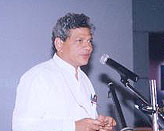Budget fails to deal with crisis: Yechury
By Shehla Raza Hasan | 08 Mar 2002
 He cited cases of starvation deaths and suicides by farmers in some states like Andhra Pradesh and Punjab. “These crises do not go together with a burgeoning food-grain stock of 60 million tonnes. This, coupled with a forex reserve of $50 billion, provides a big cushion for economic policymakers in a fiscal-deficit-ridden economy.” He was speaking at a post-budget discussion, organised by the Indian Chamber of Commerce (ICC) here.
He cited cases of starvation deaths and suicides by farmers in some states like Andhra Pradesh and Punjab. “These crises do not go together with a burgeoning food-grain stock of 60 million tonnes. This, coupled with a forex reserve of $50 billion, provides a big cushion for economic policymakers in a fiscal-deficit-ridden economy.” He was speaking at a post-budget discussion, organised by the Indian Chamber of Commerce (ICC) here.This year’s budget, he said, increased the prices of essential commodities, as in the case of LPG. “The extra expenditure will eat into the disposable income of consumers - not advisable for an economy that does not have a necessary demand. The tax net should be widened to include the rural rich, along with a food-for-work programme for the poor, in order to effectively utilise the giant food-grain stocks.”
The employment potential of the country has been further lowered by the dereservation of the small-scale sector and a shortfall of Rs 850-crore cash component allocated for rural employment, he said. “There is a paradox in the budget, as it cut subsidies for the poor and gave concessions to the rich.”
What is needed is a diagnosis of the bottlenecks in the Indian economy, he said. “Till now the government was busy making capital available at attractive rates to producers, but there wasn’t a single consumer for the products - this is like putting the cart before the horse. There is nothing to be euphoric about the 5.7-per cent growth in agriculture and allied sectors, as the maximum growth has come from the allied sector.”
C K Dhanuka, who was till recently the president of ICC, said the issue of infrastructure development needs immediate attention. “While every budget has made increasing outlays for expenditure in the infrastructure sector, we all know that the actual implementation has been well below the potential. Unless we improve the infrastructure, we cannot build an economic growth in any sector - be it agriculture, industry or services. I hope the implementation issues and the actual expenditure of the outlays marked are actually utilised, or else the nation will remain crippled.”
Industrialist Sudhir Jalan said the failure of the last year’s ‘dream budget’ was due to extraneous factors like the September 11 terrorist strikes in the US, the overall global economic slowdown, the Tehelka controversy and the UTI scam.



















